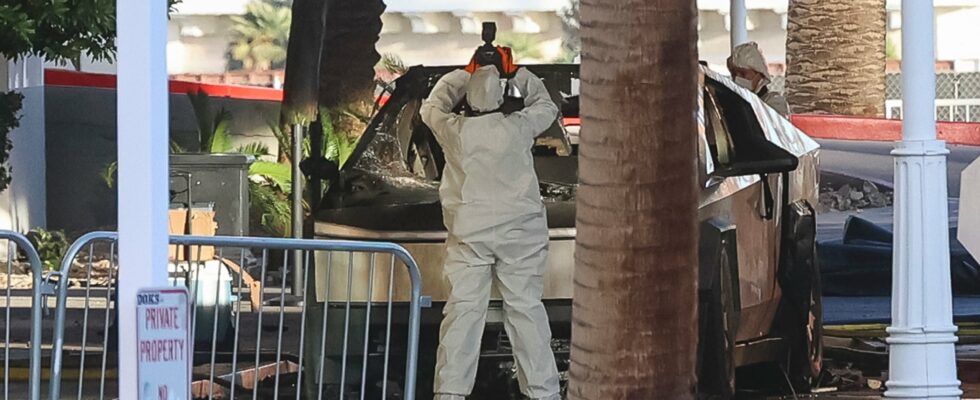Just a few hours after the car-ramming attack this Wednesday, January 1 in New Orleans, which left 14 dead and around thirty injured, another event shook America: the spectacular explosion of a Cybertruck vehicle Tesla in Las Vegas, in front of the Trump hotel. Immediately, suspicions turned to a coordinated double terrorist attack. A lead which seems to dry up this Friday, January 3, with investigators affirming that the motivations of the suspect found dead in Las Vegas are so far “unknown”, and that the latter would have committed suicide before the explosion. L’Express takes stock of what we know about this event.
What happened?
This Wednesday, January 1, just a few hours after the attack in New Orleans, a Tesla Cybertruck vehicle exploded in front of the Trump hotel in Las Vegas, causing a huge cloud of smoke. One person was found deceased inside the vehicle, while seven other people were slightly injured.
Cans of gasoline and “large fireworks mortars” were found in the rear of the vehicle, likely having caused the explosion. Las Vegas Sheriff Kevin McMahill said the Cybertruck’s structure “helped limit the damage.”
This Thursday, new information was revealed by the American authorities: the main suspect, the man found dead in the vehicle, committed suicide with a gunshot to the head “before the vehicle exploded.”
Who is the suspect?
“Matthew Livelsberger, 37, of Colora Springs, Colorado, was identified as the driver of the vehicle in the investigation into the explosion,” Las Vegas police said on their X account. Citing the office of “Coroner” (forensic doctor), she specifies that he committed suicide. “His burned body is unrecognizable,” added the town sheriff, affirming at that time that he could not confirm “100%” that this soldier was the individual found inside the Cybertruck, waiting to be transported. DNA analyses. The authorities also found identity papers in the name of this soldier on site.
Matthew Alan Livelsberger was a member of the US Army’s Special Forces, serving in Germany but who was on “approved leave at the time of his death”, a Pentagon spokesperson said in a statement. According to this spokesperson, the man, a decorated soldier, joined in 2006 and served in the army until 2011, before joining the National Guard then the reserve army, and finally joining the special forces in 2012.
In the rented Cybertruck Tesla, the authorities found “two semi-automatic handguns”, purchased “legally” on December 30, 2024 by Matthew Alan Livelsberger, added Kenny Cooper, of the federal agency ATF, in particular in charge of questions of firearms. One of the weapons was found at the foot of the body of the individual present in the vehicle, according to the authorities.
What were his motivations?
This is precisely where the investigation so far lacks elements. “The suspect’s motives remain unknown at this stage. […] “We don’t have information that allows us to say with any certainty or suggest that this was motivated by any particular ideology,” FBI Special Agent Spencer Evans told a news conference.
One avenue remains intriguing: blowing up a vehicle from Elon Musk’s car brand in front of a hotel belonging to Donald Trump, while the two men appear inseparable in recent months and the former will even join the latter’s government in the coming weeks , necessarily raises doubts. “This is an explosion that undoubtedly presents worrying factors. It has not escaped us that the attack took place in front of the Trump building and that it involved a Tesla vehicle,” declared Spencer Evans, without to establish a causal link.
While the explosion occurred hours after the car-ramming attack in New Orleans, many had also feared a link between the two events and a coordinated attack on American soil. However, the FBI affirmed this Thursday that there was no “irrefutable link” between what happened in New Orleans and Las Vegas. There is no information at this time indicating a connection between Las Vegas bombing suspect Matthew Alan Livelsberger and any “terrorist organization in the world,” agent Spencer Evans said.
Asked if he could designate this act as a “suicide mission”, the sheriff of Las Vegas, Kevin McMahill for his part assumed it: “I have no problem qualifying it as suicide considering the explosion which occurred immediately afterwards.
